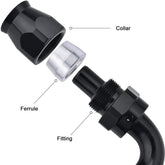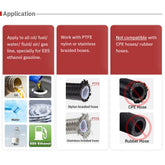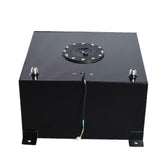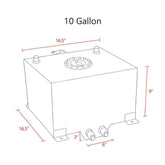What is the DPF?
A device called a Diesel Particulate Filter (DPF) is used to filter soot or diesel particulate matter out of a diesel engine's exhaust gas. It was intended that the reduced air exhaust flow caused by the fitted and operating DPF would lower fuel mileage and performance. You may increase performance and fuel efficiency as well as potentially add more horsepower and torque by removing the DPF. Due to the increased efficiency of contemporary emission systems, this is no longer the case.
The advantages of DPF delete
Let's first discuss some of the advantages of a DPF delete before discussing the risks and whether or not we should do a 6.7 DPF or EGR delete:
1. It removes the need to service the DPF at regular intervals (cleaning, replacement)
2. A DPF delete will remove the possibility of a DPF failure which could cause expensive diesel repairs
3. Due to less exhaust backpressure, the DPF delete increases exhaust flow and therefore increases the performance of your motor!
4. Paired with an ECU remap, the DPF delete is proven to increase power and torque for all vehicles
To realise the true benefits of having the DPF removed, a PPD Performance ECU remap is highly recommend to maximise the fuel mapping and remove any DPF error codes that may arise from the DPF delete.
DPF delete effects on engines
Engine efficiency may suffer if a vehicle's DPF (diesel particulate filter) is removed. By trapping particulate matter, such as soot, in the exhaust of a diesel engine, the DPF is intended to assist in lowering emissions. The engine is designed to function best while the DPF is present, therefore removing it may result in worse fuel economy and higher emissions.
The engine may emit more particulate matter and other hazardous emissions without the DPF, which could be bad for the environment and for people's health. Furthermore, taking off the DPF may result in more wear on engine parts and might reduce engine longevity.
After a DPF removal, customers are typically satisfied because they believe the engine is running more efficiently. It depends on the process, the delete kit, and the timing and method of the DPF remove. An improper or rough DPF deletion procedure can eventually harm the engine.
Should we perform a DPF delete or not
A DPF delete can increase a diesel engine's performance and fuel efficiency, but if done incorrectly, it can also have detrimental effects. Among the risks associated with a DPF delete are the following:
Increased engine wear and tear: Eliminating the DPF may result in a lean engine, which may lead to more engine wear and tear and even engine failure.
Increased emissions: A DPF deletion may result in the car emitting more particulate matter, which may be prohibited in some places and have an adverse effect on the environment.
Reduced fuel efficiency: Any possible performance improvements may be outweighed by the more gasoline used when the DPF is removed.
Consequences for the law: In many nations, it is forbidden to alter a car's emissions control system in any way that raises emissions.
Risk to human health: When the engine releases pollutants into the atmosphere, a DPF deletion may result in serious health risks for people.
It is crucial to thoroughly weigh the advantages and disadvantages of a DPF delete before moving forwards. Before making any changes to your car, it is always preferable for the client to speak with a skilled mechanic or professional if you are thinking of having your DPF deleted.
Alternatives to DPF Deleting
DPF deletion is not the only way to increase engine performance without raising emissions. Upgrading the engine with a more effective exhaust system or a DPF is one possibility. With less of an impact on the environment, this can offer the same advantages as DPF deletion.
Using biodiesel or other alternative fuels that emit fewer emissions than conventional diesel fuel is an additional choice. Made from sustainable resources like vegetable or animal fat, biodiesel can cut PM and NOx emissions by up to 50%. Not to be overlooked are other alternative fuels like natural gas or hydrogen, which can also significantly lower pollution.
The Importance of Reducing Emissions for a Sustainable Future
For a sustainable future, diesel engine emissions must be reduced. Diesel engines contribute to a number of environmental and health issues as well as being a major source of air pollution and glasshouse gas emissions. We can lessen the effects of climate change, preserve public health, and enhance air quality by cutting back on emissions from diesel engines.
Diesel engine emissions can be decreased in a variety of ways, such as by upgrading engines with more efficient technology, employing alternative fuels, and installing emissions control systems like DPFs. Car owners may gain temporarily from DPF deletion, but there are serious long-term effects on the environment and public health. To build a more sustainable future, we must cooperate to encourage proper car maintenance and lower emissions from diesel engines.









